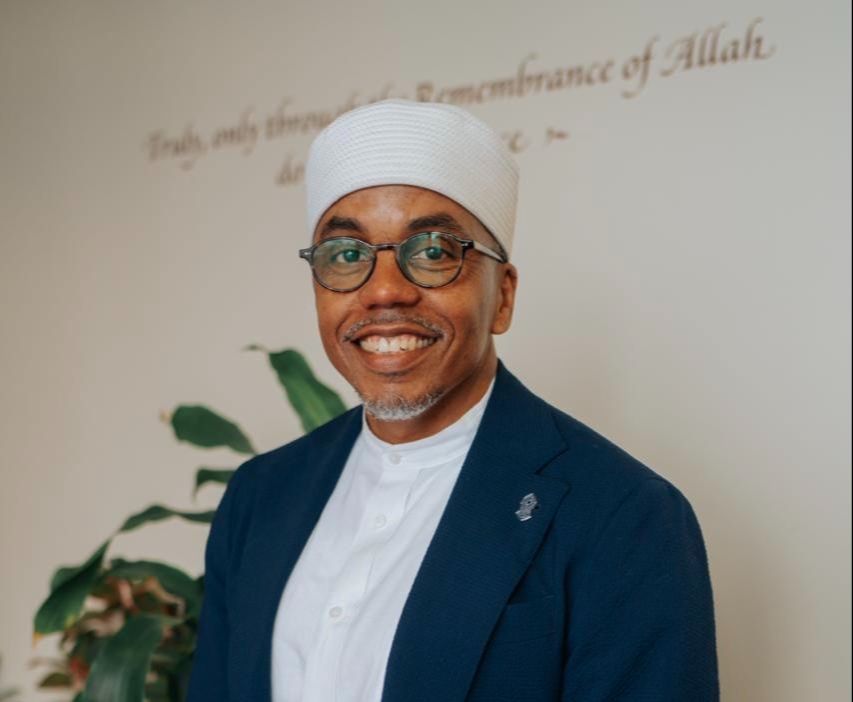
About Khalis Rashaad
Khalis Rashaad has served the Muslim community in a teaching capacity for thirty years. His current studies with his teachers consist of theology, jurisprudence, and spirituality.
His teaching style focuses on empowering others to engage with the Islamic tradition and apply it in their lives in a practical way. Khalis explores real-world applications of God’s law with a commitment to solving issues relevant to western believers, whilst also educating the Muslim and non-Muslim public alike on the religion of Abraham (millat Ibrāhīm). He likes to connect grand religious ideas with our messy human reality and articulate theological points of view to challenge and deepen our thinking.
His focus is on Qur’anic exegesis (tafsīr), narrative building, and applied theology and spirituality in an American context. He is deeply interested in how faith can practically and constructively speak to western believers’ social, political, and ethical interactions today. Khalis holds licenses (ijāzah) in jurisprudence, theology, and spirituality.
He also holds advanced professional qualifications, including an MBA and CPA. Khalis is currently a PhD candidate in Islamic Jurisprudence (Fiqh), furthering his research into the practical application of Islamic law in the western context.
Khalis has been entrusted with ijāzah (license) and ithn amīn (complete trusted permission and spiritual authorization) by Shaykh Muḥammad Aḥmad al-Jīlānī of The Gambia, West Africa, to receive those who enter into bayʿa (the covenant of discipleship) with him for their tarbiya (spiritual nurturing). Through this trust, those who take his hand become his murīds, while their connection remains linked by the silsila (chain of transmission) reaching back to the noble master Shaykh ʿAbd al-Qādir al-Jīlānī (may Allah be pleased with him).
Shaykh ʿAbd al-Qādir al-Jīlānī (470–561 AH / 1077–1166 CE) is widely recognized as a Ḥasanī and Ḥusaynī sayyid, meaning he traces his lineage back to the Prophet ﷺ through both grandsons. Most genealogical records emphasize his Ḥasanī lineage. His full nasab (lineage) is usually recorded as: ʿAbd al-Qādir ibn Abī Ṣāliḥ Mūsā ibn ʿAbd Allāh ibn Yaḥyā al-Zāhid ibn Muḥammad ibn Dāwūd ibn Mūsā al-Thānī ibn ʿAbd Allāh al-Thānī ibn Mūsā al-Jawn ibn ʿAbd Allāh al-Maḥḍ ibn al-Ḥasan al-Muthannā ibn al-Ḥasan ibn ʿAlī ibn Abī Ṭālib (رضي الله عنهم). This makes him a direct descendant of Imām ʿAlī and Sayyida Fāṭima (رضي الله عنهما), and thus of the Beloved Prophet ﷺ.

About Khalis Rashaad
Khalis Rashaad has served the Muslim community in a teaching capacity for thirty years. His current studies with his teachers consist of theology, jurisprudence, and spirituality.
His teaching style focuses on empowering others to engage with the Islamic tradition and apply it in their lives in a practical way. Khalis explores real-world applications of God’s law with a commitment to solving issues relevant to western believers, whilst also educating the Muslim and non-Muslim public alike on the religion of Abraham (millat Ibrāhīm). He likes to connect grand religious ideas with our messy human reality and articulate theological points of view to challenge and deepen our thinking.
His focus is on Qur’anic exegesis (tafsīr), narrative building, and applied theology and spirituality in an American context. He is deeply interested in how faith can practically and constructively speak to western believers’ social, political, and ethical interactions today. Khalis holds licenses (ijāzah) in jurisprudence, theology, and spirituality.
He also holds advanced professional qualifications, including an MBA and CPA. Khalis is currently a PhD candidate in Islamic Jurisprudence (Fiqh), furthering his research into the practical application of Islamic law in the western context.
Khalis has been entrusted with ijāzah (license) and ithn amīn (complete trusted permission and spiritual authorization) by Shaykh Muḥammad Aḥmad al-Jīlānī of The Gambia, West Africa, to receive those who enter into bayʿa (the covenant of discipleship) with him for their tarbiya (spiritual nurturing). Through this trust, those who take his hand become his murīds, while their connection remains linked by the silsila (chain of transmission) reaching back to the noble master Shaykh ʿAbd al-Qādir al-Jīlānī (may Allah be pleased with him).
Shaykh ʿAbd al-Qādir al-Jīlānī (470–561 AH / 1077–1166 CE) is widely recognized as a Ḥasanī and Ḥusaynī sayyid, meaning he traces his lineage back to the Prophet ﷺ through both grandsons. Most genealogical records emphasize his Ḥasanī lineage. His full nasab (lineage) is usually recorded as: ʿAbd al-Qādir ibn Abī Ṣāliḥ Mūsā ibn ʿAbd Allāh ibn Yaḥyā al-Zāhid ibn Muḥammad ibn Dāwūd ibn Mūsā al-Thānī ibn ʿAbd Allāh al-Thānī ibn Mūsā al-Jawn ibn ʿAbd Allāh al-Maḥḍ ibn al-Ḥasan al-Muthannā ibn al-Ḥasan ibn ʿAlī ibn Abī Ṭālib (رضي الله عنهم). This makes him a direct descendant of Imām ʿAlī and Sayyida Fāṭima (رضي الله عنهما), and thus of the Beloved Prophet ﷺ.

